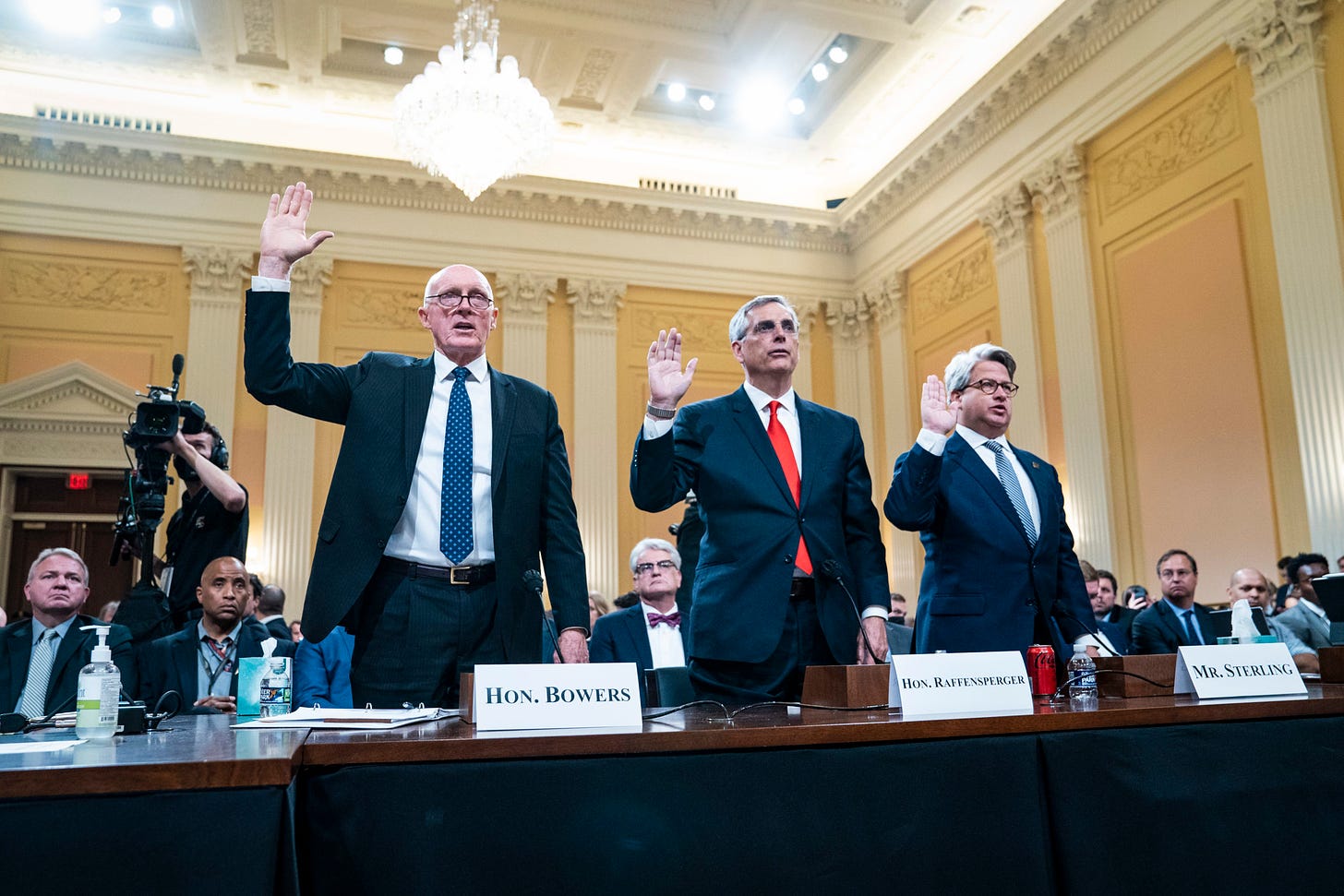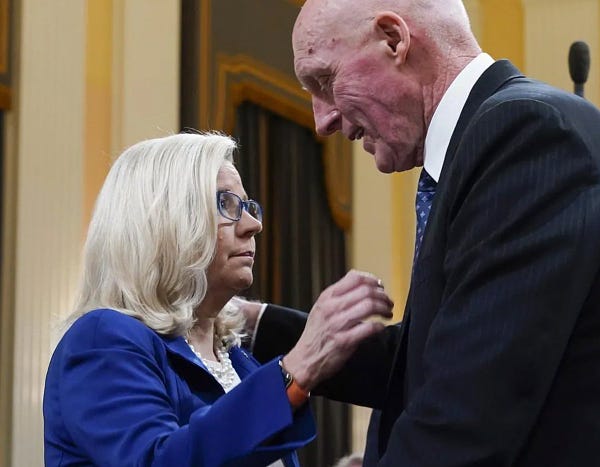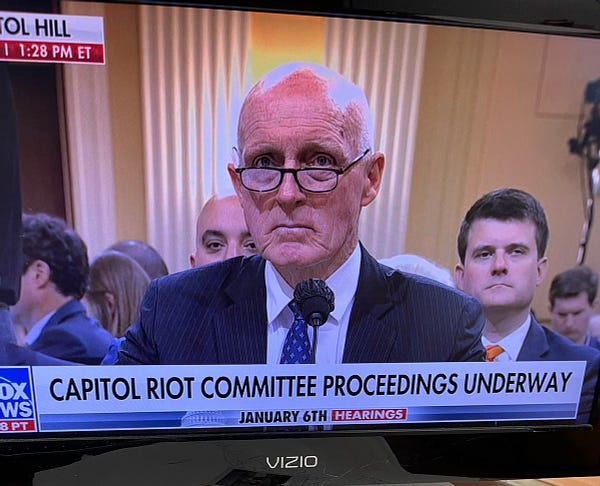
It is hard to fathom not being moved by the testimony given before the House January 6th Committee this week by Russell “Rusty” Bowers, the Republican who has been speaker of the Arizona House of Representatives since 2019. Bowers explained in detail the efforts by then-President Donald Trump and his team to pressure him to support the false claims and conspiracy theories that Trump was the rightful winner of the 2020 election in their state and ultimately in the whole country.
Bowers testified that Trump not only lied about a phone call with him, falsely claiming that Bowers agreed with his Big Lie about the stolen election, but also that Trump ratcheted up the pressure on state legislative leaders to hold hearings about the election—and even to vote to toss out Arizona’s Biden electors and replace them with a new slate of Trump electors.
Bowers would have none of it. In his testimony, he movingly described how the Trump team’s efforts conflicted with his most deeply held beliefs:

Bowers’s reverential remark that “it is a tenet of my faith that the Constitution is divinely inspired” is an apparent reference to his Latter-day Saints (Mormon) beliefs.
Trump’s lower-level supporters also joined in the effort to harass Bowers. They clogged Bowers’s email accounts, text message inbox, and voicemails. As he told the committee, tens of thousands of emails and voicemails and text messages
saturated our offices and we were unable to work, or at least communicate. But at home, up till even recently, it is the new pattern—or a pattern in our lives—to worry what will happen on Saturdays, because we have various groups come by and they have had video-panel trucks with videos of me proclaiming me to be a pedophile and a pervert and a corrupt politician, and blaring loudspeakers in my neighborhood and leaving literature both on my property, and—but arguing and threatening with neighbors and with myself.
Bowers also described people like the “Three Percenter” who showed up armed outside of his house, verbally threatening his neighbor, all while Bowers’s gravely ill daughter was inside, spending her last days on earth likely worrying about the safety of her family.
Unlike, say, Vice President Mike Pence, who while in office lived in a mansion on a heavily guarded military facility in Northwest Washington, Rusty Bowers doesn’t get government housing with top-notch security and a Secret Service detail. Bowers’s salary as a legislator is just $24,000 a year, a figure that hasn’t changed since 1998, five years after he was first elected to the statehouse.
Until Jan. 6th, Vice President Pence seems not to have experienced much in the way of outside pressure encouraging him to steal the election for Donald Trump. Rusty Bowers did, and for standing true to his oath, he was presented with a Profile in Courage Award from the JFK Library Foundation (along with Shaye Moss, who also testified before the committee earlier this week, and Rep. Liz Cheney, who is the committee’s vice chair).
For his efforts to live up to his oath as a “rule of law” Republican—remember those?—Arizona Republican voters tried to recall Bowers from office. That effort failed, but his fellow Arizona Republicans have continued to attack him following his committee testimony this week:


Even as Bowers is being attacked by his fellow Republicans, he is also running for a seat in the Arizona Senate. Back in 1992, the state’s voters passed term limits, meaning that any state legislators who wish to serve for more than a few years for low pay must shuffle back and forth between the two chambers. (Bowers was a state senator from 1997 to 2003; during his years out of office, he apparently worked as an artist.)
Given the coercion attempts and harassment Bowers faced after the 2020 election, his principled refusal to go along with Trump’s coup, his stirring testimony before the Jan. 6th Committee, and the attacks from his own party that he’s now facing, what I’m about to tell you next might come as a surprise. Or you just might find it disappointing, like I do.
The day before his testimony, Bowers told an Associated Press reporter this about Donald Trump:
If he is the nominee, if he was up against Biden, I’d vote for him again. . . . Simply because what [Trump] did the first time, before COVID, was so good for the country. In my view it was great.
I don’t know about you, but it’s hard to square the testimony Bowers gave about how Donald Trump’s Big Lie dominated his personal and professional life—pretty much every day for months—with saying he’d vote for Trump over Joe Biden again.
Especially if my dying daughter’s peace was disturbed because Bad Orange Man’s wounded ego stirred up deranged deplorables armed with guns to rally outside my home.
Maybe Bowers really just doesn’t like Joe Biden for some reason—which is fine, of course. Or maybe Bowers is just saying what he needs to say, being a politician and all, to keep his job in Phoenix, and he thinks otherwise privately.
I’m inclined to take Bowers at his word, although his statement to the AP does seem phrased to not rule out a scenario in which Bowers might vote against Trump if somebody other than Biden were running against him.
As Bowers was testifying on Tuesday, voters where I live were choosing between six pro-Trump chuckleheads to face off against centrist Democrat Abigail Spanberger in Virginia’s newly drawn 7th Congressional District. Each of them played patty-fingers with the Big Lie about the election, or refused to take a stance. That’s either what they truly believe or what they think Republican voters require of them. As a result, none of them got my vote.
What about Rusty Bowers? His political future is an interesting test case for the sliver of the electorate that still takes an interest in GOP primaries but remains opposed to Trump. How should pro-democracy former Republicans and independents, and any remaining Never Trump Republicans, think about Republicans running for office today? What sort of litmus test should one have for picking candidates?
Your mileage may vary, but I am generally a pretty harsh judge. Enthusiastic Trumpers and supporters of the Big Lie are a certain no vote for me. One of the six GOP chuckleheads running for Congress in my district knocked on my door, and I didn’t even give him the courtesy of a cracked-door rejection.
Likewise, a college friend of mine, now a Missouri state legislator, signed this election conspiracy letter. Other legislators I know did, too. If I still lived in Missouri, I would not vote for them: There is no political redemption for such actions.
And that’s the key: What actions did they take? What actions didn’t they take? What did they say? What did they refuse to say?
Rusty Bowers may have a bad opinion about how he’d vote in a Biden vs. Trump rematch, but he tied himself to the mast during the worst of the 2020 storm.
Bowers’s primary opponent this year is former state senator David Farnsworth, who is an absolute nutjob—even by the standards of Arizona, which has plenty of nutjobs in elected office.
Farnsworth thinks the Arizona Department of Child Safety is involved sex trafficking, an obsession popular among QAnon adherents. Does he have any evidence? Nope. In an article about him calling the police on another state senator in 2019 who told him to stop bringing crazy people to the state capitol, Farnsworth admitted “I have no proof” of his sex-trafficking claims, “but those are my darkest fears.”
Farnsworth is also buddies with Donald Trump and, not shockingly, is an election truther who, as a state senator, pushed for a set of fake electors.
The Bowers vs. Farnsworth primary is in August, and while the incumbent is a Democrat, she is vacating the seat, running for Congress—and there are no Democrats running to succeed her. It’s just Bowers and Farnsworth, one of whom will face off in the general election against an independent, Nick Fierro, who does not seem to have a good shot.
I strongly disagree with Bowers’s willingness to vote for Trump again. But during the 2020 election crisis, he acted consistent with his oath of office and never wavered when many others did. We could use more people like that in elected office.






